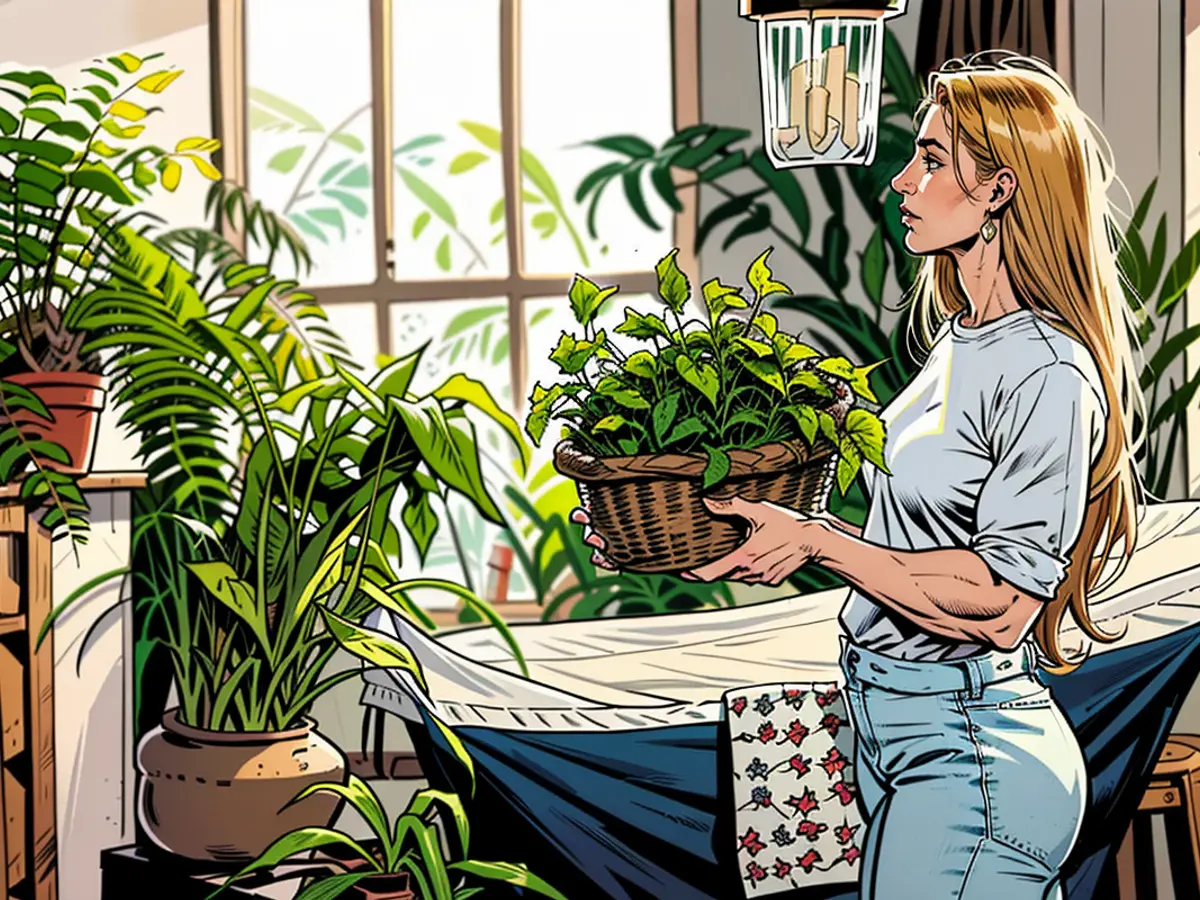Into vacation! How do I water the balcony and garden now?
Two weeks of travel and a question: Will the balcony and garden plants survive? Why neighbors usually don't have to water daily - and how to properly train your plants beforehand.
Anyone who owns a lush flower or vegetable garden or has lovingly planted their balcony can't fully enjoy a longer summer trip without the thought: Will the plants survive two, three weeks, perhaps with heat waves? The good news: With good preparation and the help of neighbors, they definitely have chances.
Are your plants properly trained?
"Who trains their plants in the garden fundamentally to grow deeper roots and use water from the lower soil layers, has fewer concerns," reassures Martin Breidbach. He is a horticultural specialist with the Association of Apartment Owners in Bonn.
This is achieved by not watering routinely every day but only when necessary. Once or twice a week is a good guideline. "But then thoroughly, depending on the plant inventory," advises Jörg Korfhage, gardener and trainer at the DIY Academy in Cologne. The general recommendation for watering amounts is 15 to 20 liters per square meter, more on hot days.
On the balcony, where plants grow in flowerpots, plant boxes, or buckets, the roots are limited by the confinement and shallow depth of the plant pots. "Therefore, balcony plants usually need to be watered more frequently than garden plants," says Martin Breidbach.
Mulching and Hacking keep moisture in the soil
To prevent the upper soil layer from drying out too quickly, it is recommended to apply a three to four centimeter thick layer of mulch or grass clippings. "Before spreading the layer, the soil should be thoroughly watered," says Jörg Korfhage. This keeps the moisture in the soil.
Another tip to reduce evaporation is hacking. This interrupts the capillaries, the long, tubular spaces that form when water seeps into the soil. By hacking diligently, water cannot directly rise to the surface through these capillaries. "One hack saves three waters, they say. It's best to combine hacking and mulching," advises Martin Breidbach.
Some plants require more water than others
Of course, it's important to note that not all plants in the garden or on the balcony need the same amount of water. Citrus and olive tree seedlings in pots, for example, can go without watering for a loose half week, while geraniums and petunias in flower boxes need to be watered once or even twice a day in hot weather. "Watering them all routinely every evening would be the wrong approach," says Jörg Korfhage.
In any case, it's better to water the balcony or garden in the early morning instead of the evening. "An moist environment around the plants overnight is not good for them," says Martin Breidbach.
Neighbors don't have to water daily
Helpful neighbors often tend to water the plants of travelers too much rather than too little. "But they really don't have to do this work," so Martin Breidbach. "Too much water harms them more. Plants cope better with drying out once than standing in a swamp all the time. Then the roots rot and the plant is no longer salvageable."
It's best to closely observe them. If a plant lets its leaves hang, it needs water.
From smart to DIY: Irrigation Systems
However, there are also technical aids that recognize the needs of plants. Irrigation systems for balcony and garden make it easy to bridge several vacation weeks. They are also useful in everyday life.
"The most effective and economical is subsurface irrigation. Instead of watering the entire garden area with water from above through lawn sprinklers, it makes more sense to give the water directly to the soil where it is needed," says Breidbach. Such systems are also used in professional fruit and vegetable farming. "They water the plants only when the sensor indicates that the soil is too dry."
For the balcony or in the greenhouse, simpler solutions like round or conical clay pots work. They are placed a few centimeters away from the plant and buried in the ground as deep as possible. "Through the porous clay, the water reaches the root zone gradually," explains Martin Breidbach. Depending on the plant species and the size of the pot, this system can supply the plants for a few days. If it is particularly hot, several clay pots can be added.
Who doesn't have clay pots can achieve similar results with water bottles. A hole is drilled in the lid of a plastic bottle and the bottle is placed upside down in the ground. The water then seeps out of the bottle into the root zone.
Help, my plants have shed leaves!
If the plants look a bit worse for wear after returning from vacation, that's usually not a big problem. "Even garden plants that have shed their leaves in summer do not necessarily mean the end," says Martin Breidbach. "On the contrary, that's a natural reaction to heat and drought. If they get enough water, the plants will come to life again."
Even shrubs often regain their vigor. "Water thoroughly several times, cut back to the green part, and lightly prune," advises Jörg Korfhage.
- During your vacation, you might worry about the heatwave affecting your plants, especially if you're planning to be away for two or more weeks.
- To ensure your balcony plants survive during your absence, Martin Breidbach suggests training them to grow deeper roots that can access water from the lower soil layers, reducing the need for daily watering.
- In contrast to garden plants, balcony plants require more frequent watering due to their limited root depth. Sustainable watering practices, such as mulching and hacking, can help maintain moisture in the soil and reduce evaporation.
- Consumers looking for a smart solution to manage water for their plants during vacations might consider installing an irrigation system, like subsurface irrigation, which delivers water directly to the soil where plants need it most.







